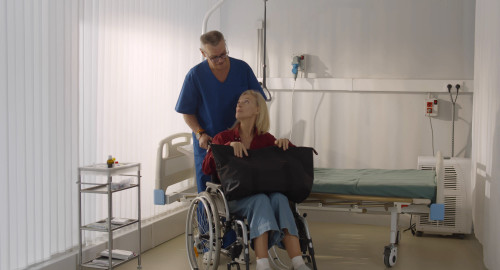Five things you can do to avoid hospital readmission
Home is a wonderful place to heal and recover after a hospital stay — if you have the systems and support in place to help ensure your recovery. Here are some things you can do to help avoid hospital readmission.
What to do before you go
Before going to the hospital, get your home ready. Falls are a major reason people are readmitted to the hospital. Move any hazards like throw rugs or excess clutter to reduce hazards of tripping or falling. Keep everything you need within reach and get your caregiver’s help to get back and forth from the bathroom. Wear non-skid footwear such as rubber-soled slippers or non-skid socks to help you keep your balance.
Talk to your doctor about the level of care you will need. You will likely need help of some kind as you recover, be it from family or friends or an in-home health expert. Your hospital can help you arrange in- home health support. If your doctor determines that you need in-home care, they should give you a list of agencies in the area. Aspire Health Medicare Advantage plan members can contact Member Services at (855) 570-1600 with any questions about care after a hospital stay.
What to do at discharge
Before you are released from the hospital, make sure to speak up about how you’re feeling. Some symptoms will need to be monitored and some your doctor will need to know about right away. While some signs of possible readmission can be monitored (such as blood pressure), patients need to alert their doctors to things such as lightheadedness or trouble breathing before leaving. These are symptoms that may lead to readmission in the hospital.
Take thorough notes about your discharge instructions. Have a family member or friend with you so that they can help you listen to the instructions your doctor gives you. Before the discharge process, you can ask for a paper and pen to write down any questions. If English is not your first language, you can ask for language assistance. You should also ask the discharge nurse to write down the instructions. Following these instructions closely will help you recover without having to return to the hospital.
You will likely be contacted by one of Aspire Health Plan’s transition care nurses shortly after discharge. Accepting their help is the single most important thing you can do to avoid having to go back to the hospital.
What to do with your medications
The most important thing you can do to avoid hospital readmission is to understand your medicines and take them appropriately. Ask about any changes to your medicines, all new medicines, and medicines you should stop taking. Once you are discharged from the hospital, get prescriptions filled as soon as possible so you don’t miss a dose. Read our previous blog post for more tips managing your medications. If you have any problems getting all of your prescriptions filled, including difficulty affording them, call Aspire Health Plan right away. Missing prescribed medications is one of the most common reasons patients have to be re-admitted to the hospital.
What to do at follow-up appointments
Follow up with your primary care provider (PCP) after you come home from the hospital. This visit will allow you and your doctor to review any changes to your health and medicines while you were in the hospital. Make sure to tell your doctor about any new signs or symptoms. As we discussed in a previous blog post, your PCP coordinates your care and works with specialists in your area. Your PCP will be able to work with the hospital to make sure you get the best ongoing care and help you recover without readmission to the hospital.
If you are unable to drive to your follow-up appointments, there are several ways to arrange for transportation:
- Aspire Medicare Advantage provides extra benefits, including non-emergency transportation – trips to doctor’s appointments, physical therapy, pharmacies, or hospitals. If you have any questions, reach out to your Member Advocate or Member Services to arrange your ride.
- There are also local community programs available to provide rides to doctor’s appointments. Many of these programs are run by volunteers or non-profits, and you can usually call your local Alliance on Aging for assistance. Monterey County partners with ITN for transportation, but will use other options if needed.
If you would like more details about Medicare coverage for transportation, check out a previous blog post.
What to do with specialized equipment
Your doctor may ask for you to have special medical equipment at home, including oxygen, a hospital bed, wheelchair or other safety equipment. Our Member Services Team can help you secure specialty equipment to recover without hospital readmission. Give us a call at (855) 570-1600 if you need help getting medical supplies.
The first few days and weeks at home can be challenging. We want you to feel better. Following all these simple steps can help you get there. If you have any questions, give the Aspire Health team a call or leave your questions in the comments below.
H8764_MKT_TipsReAdmission_0622_C


